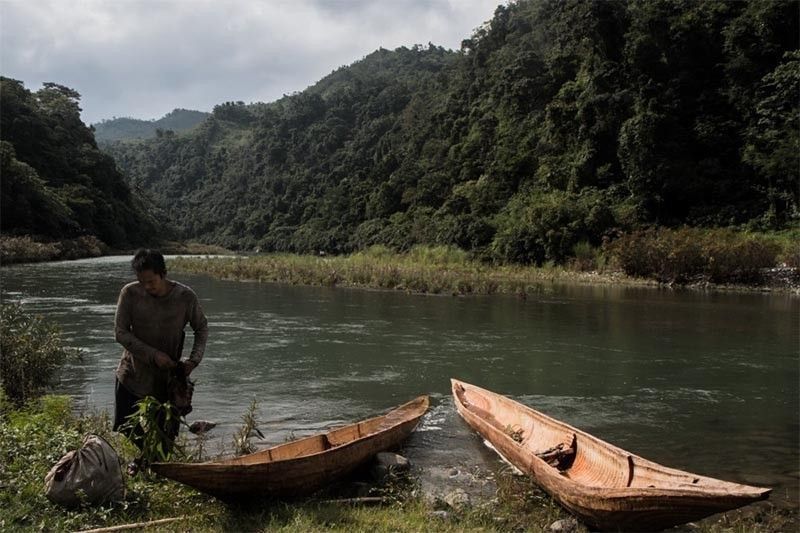Dumagat leader disputes MWSS claim of community support for Kaliwa Dam

MANILA, Philippines — A Dumagat leader on Thursday disputed reports that his people have approved construction of the Kaliwa Dam, a project that will affect indigenous peoples' communities in Rizal and Quezon.
The Metropolitan Waterworks and Sewerage System, the proponent of the project, earlier said that Dumagat communities had already given their assent for the project to push through.
Marcelino Tena of the Tribal Center for Development Foundation, an NGO opposed to the dam project, said the MWSS and the National Commission on Indigenous Peoples had "manipulated" members of the Dumagat communities to move the construction of the China-funded dam—touted as a solution to Metro Manila’s growing demand for water—forward.
In a statement Wednesday, the MWSS claimed the consultations with IPs of Quezon and Rizal last December 9 and 17 “reached positive outcome,” with the communities adopting a resolution of consent to the project.
MWSS did not identify in the statement which community clusters gave their consent to the construction of Kaliwa Dam.
“This stage, which is one of several stages in the free prior and informed consent process, shows that the IPs are able to conduct their own independent and collective discussions and decision-making in an environment where they did not feel intimidated and where they had sufficient time to discuss in their culturally appropriate way, matters affecting their rights, livelihoods, knowledge, traditions, governance systems, natural resources,” MWSS said.
The Indigenous Peoples’ Rights Act of 1997 defines FPIC as the "consensus of all members of the ICCs/IPs to be determined in accordance with their respective customary laws and practices, free from any external manipulation, interference and coercion, and obtained after fully disclosing the intent and scope of the activity, in a language and process understandable to the community."
ECC given in October
In October 2019, the MWSS obtained an Environmental Compliance Certificate for the P12.2-billion project.
Obtaining ECC allows a project to proceed to the next stage of planning, which includes securing approvals from other government agencies.
The NCIP has yet to certify that the project has FCIP. The law requires proponents of projects that would affect the ancestral land, territories and natural resources of an IP community to secure their consent first.
In its environmental impact statement submitted to the Environmental Management Bureau last year, MWSS said opposition to the dam project was limited to "a few hard-core oppositionists including some politicians using the issue as their campaign slogan."
SPECIAL REPORT: In the abundance of water: A dam project may wash away generations-old Dumagat villages
Rigged results?
According to Fr. Pete Montallana, head of the Save Sierra Madre Network Alliance, the Commission on Human Rights organized a December 9 meeting, where IPs of Quezon province "registered their opposition to the project."
Montallana and Tena accused NCIP of manipulating the results of the December 17 assembly—an FPIC consensus-building meeting—where members of the community supposedly manifested their approval of the project.
Tena accused NCIP of bribing Dumagats to say “yes” to the project.
“Inipon nila at sinuhulan ang mga ito, pinangakuan ng pamasko para magsipag-yes kaya maraming nag-yes,” Tena told Philstar.com in a phone interview.
(They gathered some of the IPs and bribed them, promised them Christmas gifts to say 'yes'. That's why many said 'yes'.)
"‘Yung mga tao na ayaw ng dam, kinontrol nila para di makapag-salita o makaboto ‘yung mga nakararami na ayaw sa dam. Pinili lang nila ‘yung ilan na nag-no at pinili nila ‘yung mga maraming nag-yes para kunwari talo kami dun sa usapin," he said.
(The many who were opposed to the dam were not given a chance to speak or to vote. They picked a few who voted 'no' and picked many who would say 'yes' so it would seem they were talking to all of us)
Tena and Montallana also alleged that most of the attendees were Dumagats who were below 50 years old.
“‘Yung mga inipon na mga tao, ito ‘yung mga di nakialam sa FPIC process, walang pakialam sa mga isyu. Kumbaga mga istambay na katutubo na walang pakialam sa isyu,” Tena said.
(The people the picked di not know about the FPIC process and don't care about the issue. They picked idlers who don't care about the issue)
Philstar.com sought MWSS Vice Chair Emmanuel Salamat for comment on the FPIC process but he has yet to respond as of this post.
PHOTO ESSAY: Agos River: Where life flows for the Dumagat people
Letter to NCIP
Around 100 individuals wrote to NCIP chairperson Allen Capuyan to protest the December 17 assembly, a letter obtained by Philstar.com showed.
The signatories asked Capuyan to invalidate the decision of the meeting because the suggestions of community leaders were not acknowledged. They added the attendees were intimidated and fed wrong information.
They said the IPs were threatened that they would not receive a portion of P20 million and fare money if they would not express their approval of the dam.
They added there were “few” people who decided on the behalf of the Dumagat-Remontados of General Nakar town in Quezon.
Montellana stressed consensus was not achieved the meeting called by the NCIP.
“In fact, there was no memorandum of agreement signed in that meeting because the “no” IPs did not sign,” he said.
CHR earlier called on the NCIP to ensure that genuine and rights-based processes of securing the approval of the affected communities would be followed.
“The right to free consent implies equally the right to dissent. If indigenous peoples are clearly opposed to a particular project, their decision should be respected and they should continue to benefit in the same way as other peoples from state benefits, development plans and serives,” CHR spokesperson Jacqueline De Guia said in October.
‘Last resort’
President Rodrigo Duterte on December 30 pushed anew for the construction of the Kaliwa Dam and the Wawa Dam in Rizal, saying calling these the “last resort to have water for Manila.”
He also warned courts not to issue temporary restraining orders to delay the projects.
Montellano said the president’s threat shows that he is afraid of a legal battle over the project, which groups say threaten the Dumagats' way of life and their traditional territory.
“But we will push that, we will go to court,” Montellano said.
The proposed major water source for Metro Manila is expected to add 600 million liters per day to the capital region’s water supply.
According to an EMB executive summary on the project, 1,465 households in three villages in Rizal and Quezon will be affected by the project. Of those, 1,041 “will be at risk of flooding and other effects of possible dam failure or dam break.”
It also said 424 households in Brgy. Magsaysay in Infanta and Pagsangahan in General Nakar will be directly affected by the project.
The dam project “will also indirectly impact 56 indigenous people households and will place around 284 IP households at risk of flooding and other effects of possible dam failure or dam break.”
According to the project’s Environmental Impact Statement, there are 67 species found in the watershed area and along the tunnel alignment that are listed under International Union for Conservation of Nature’s Red List of Endangered Species.
- Latest
- Trending
































